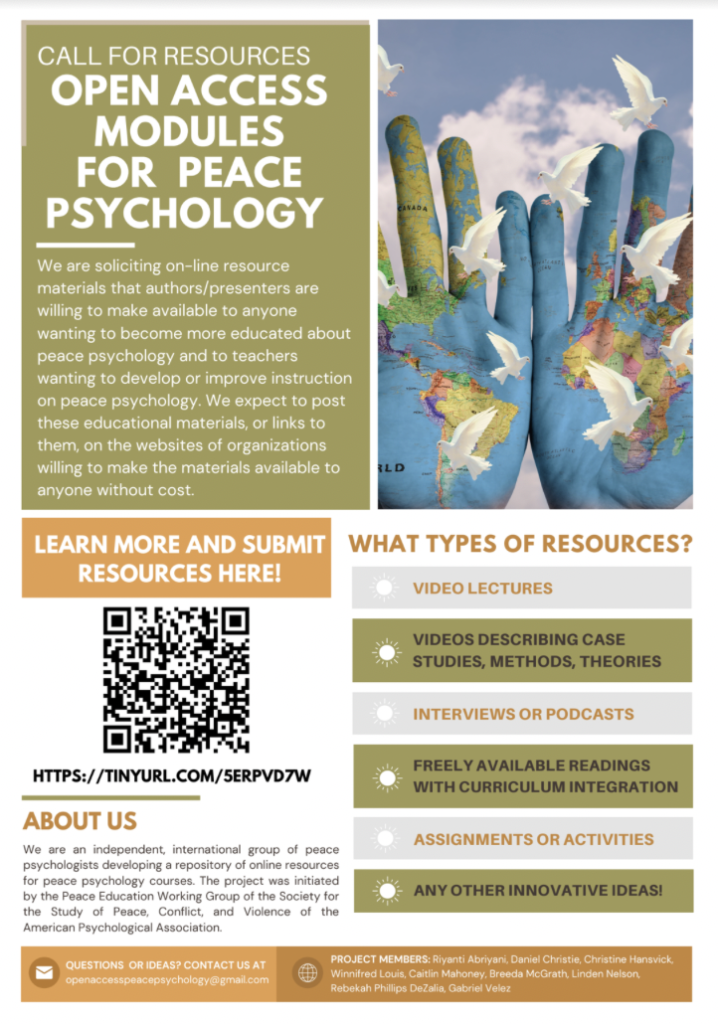Building an Open Access Repository: A Call for Instructional Resources in Peace Psychology
Gabriel Velez. Gabriel Velez, at Marquette University, is part of the Peace Education Working Group of the Society for the Study of Peace, Conflict, and Violence: Peace Psychology Division 48 of the American Psychological Association.
Intersection of Human Rights and Peace
Human rights are integrally linked to peace, especially in its nuanced conceptualization integrating positive and negative responses to structural, cultural, and direct violence. The dignity and respect of all peoples is fundamental to both human rights and peace: peaceful individuals, communities, societies, and the world lay an important and necessary groundwork for providing the conditions that ensure all people’s security, well-being, respect, and thriving. Psychology and psychologists have much to offer at this intersection. Psychological research, evaluation, and clinical practice on a wide variety of topics can contribute to richer understandings of the reasons, effective interventions, and impacts of conflict and human rights violations.
These connections, however, are not centered in mainstream psychology. While there are certainly vibrant and critical efforts and groups, such as the Global Network of Psychologists for Human Rights, there is still a need to increase awareness, resources, and training to develop more psychologists with an orientation toward protecting human rights and promoting peace.
Online Repository
With this in mind, we have recently begun to compile an online repository of instructional resources that psychologists across the world can draw on to educate students about peace and conflict and integrate these topics into their training and practice (see http://peacepsychology.org/peace-course-syllabi) . We are an independent and international group of peace psychologists whose goal is to support a more inclusive and expansive integration of peace psychology into the teaching of psychology across institutions of higher education. This project was initiated by the Peace Education Working Group of the Society for the Study of Peace, Conflict, and Violence: Peace Psychology Division 48 of the American Psychological Association.
To guide this project, we have created a list of modules, with corresponding themes and questions, that can be accessed on our public Google drive. The modules may be used independently from one another, so educators may incorporate materials from one or more of the modules for use in a lecture, unit, or course. In addition to the questions suggested within each of the modules, educators may encourage students to reflect upon their own perceptions by asking them “why” or “what do you think” questions.
We imagine that users of these resources will have different learning objectives. They will probably select from among the major content areas based upon their purposes (e.g., finding online resources relevant to a specific question, introducing peace psychology to students for future graduate work, supplementing already existing course materials).
Building a socially just social system driven by a culture of peace where human rights are respected requires a diversity of voices and collaboration. With this in mind, our project is ever evolving, growing, and intended to be inclusive and engage a broad array of psychologists and educators.
Open Solicitation for Materials
We have written this blog post as part of our open solicitation for online resource materials that authors/presenters are willing to make available to anyone wanting to become more educated about peace psychology and to educators wanting to develop or improve instruction on peace psychology and its relation to human rights. We are seeking to develop a diverse, engaging, and inclusive set of materials. These include, video lectures, videos describing case studies, theories, or methods; readings (these must be freely available online) with accompanying suggestions for how to incorporate into classroom settings, interviews with peace psychologists or human rights activists, podcasts on the identified topics, and learn-by-doing activities or assignments for students.
In line with our own values as psychologists engaged in promoting peace and upholding human rights across settings, we reach out to the broader community in an inclusive and humble spirit. Our goal is to draw on depth of knowledge, the breadth of frameworks, and the expertise across geographies and cultures to build a useful resource for educators across the globe.


